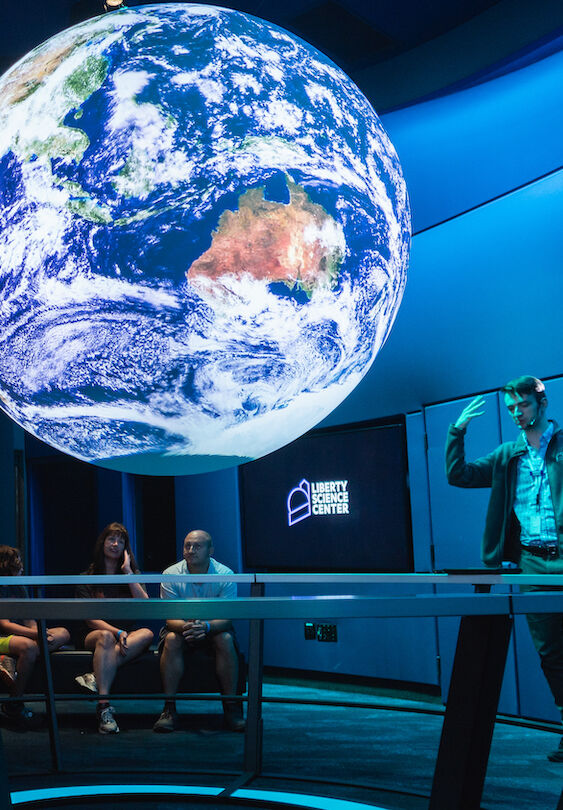Climate Change Programs
In June 2020, New Jersey became the first state to fully integrate climate education into its K-12 learning standards. The New Jersey Student Learning Standards require climate change education across seven areas: 21st Century Life and Careers, Comprehensive Health and Physical Education, Science, Social Studies, Technology, Visual and Performing Arts, and World Languages. The goal is to prepare students to understand how and why climate change happens and its impact on our local and global communities, and to act in informed and sustainable ways.
“For New Jersey to retain its position as a leader in education and clean energy and to achieve its goal of being 100 percent clean by 2050, our students must learn about the science of climate change,” says Ivory Williams, LSC's Vice President of STEM Education. “New Jersey students must be prepared to be the future scientists, policymakers, and educators who will continue to create and implement solutions to mitigate climate change.
“In addition, whether it's enduring another blazing hot summer, hunkering down during another super storm, or witnessing disappearing shorelines, our students have first-hand experience of the effects of climate change. It’s personal. They have a vested interest in making their world – current and future – a better, healthier, more sustainable place.”
We are ready to support educators with a diverse portfolio of climate change education programming. Our programs for grades Pre-K through 5 can take place at LSC, online, and at your school. Our Science On a Sphere (SOS) programs employ the ultimate data visualization tool—a six-foot illuminated globe display. Using the only publicly accessible SOS in New Jersey, these programs present a unique opportunity to see evidence of climate change in NOAA and NASA data sets vividly come to life. Other program types include laboratory workshops, young learner series, teacher professional development, and more.
For more information about adding a climate change program, call 201.253.1337, email partnerships@lsc.org, or fill out this form.
Pre-K - Grade 2
Pollinators: Honey Bees (30-45 Minutes)
Available online, at LSC, or at your school. Have you thanked a bee today? Pollinators provide an essential service to the ecosystem. At least a third of the world's crops depend on pollination provided by insects and other animals. Honey bees produce and store honey, but they also help to make other favorite foods. Design a pollination device that works just as hard as a busy bee.
My Eco-Friendly Self (Five Sessions; Each 45 Minutes)
Available at LSC or at your school. Can plants and animals change their environments? Build models to discover how animals like beavers do just that. But it’s not just beavers making changes. Did you know we can also change our environment? Explore how our choices can positively, and sometimes negatively, affect our environment and the animals that inhabit it. Learn how to make more eco-friendly choices.
Weather, Weather, Everywhere (Five Sessions; Each 45 Minutes)
Available at LSC or at your school. What makes up the weather we see outside every day? Through a variety of hands-on programs, learn the components of weather and explore tools meteorologists use to describe, record, and notice patterns over time.
Rain, Rain, Go Away! (30-45 Minutes)
Available online or at LSC. Explore causes of our weather using Science On a Sphere. See how Earth’s weather changes from place to place and season to season.
Grades 3 - 5
Weather vs. Climate (30-45 Minutes)
Available online or at LSC. Watch Earth data sets come alive on Science On a Sphere. Explore climate changes over time and how the short-term weather changes are different from the long-term changes of climate.
Climate Change (30-45 Minutes)
Available online or at LSC. Explore the causes and impacts of climate change using Science On a Sphere, the digital globe developed by NOAA to bring Earth’s processes vividly alive. Collaborate to brainstorm creative solutions to address the vital issue of climate change.
Grow Green (45-60 Minutes)
Available online, at LSC, or at your school. Why is it so much hotter in a city than in the country in the summertime? Can we use plants to cool down? Learn about the urban heat island effect as you complete an engineering design challenge to create your very own model green roof!
Introduction to Spheres (30-45 Minutes)
Available online or at LSC. Science On a Sphere brings the nature of Earth Systems Science vividly to life. Explore the geosphere, hydrosphere, atmosphere, and biosphere and how these spheres interact with one another.
Grades 6 - 8
Climate Change (30-45 Minutes)
Available online or at LSC. Explore the causes and impacts of climate change using Science On a Sphere, the digital globe developed by NOAA to bring Earth’s processes vividly alive. Collaborate to brainstorm creative solutions to address the vital issue of climate change.
Grades 9 - 12
Climate Change (30-45 Minutes)
Available online or at LSC. Explore the causes and impacts of climate change using Science On a Sphere, the digital globe developed by NOAA to bring Earth’s processes vividly alive. Collaborate to brainstorm creative solutions to address the vital issue of climate change.
Teacher Professional Development
Climate Change: Classroom Connections
Educators will engage in sample activities that address the science of climate change. The activities will have an interdisciplinary focus, highlighting that every area of study has a part to play in addressing climate change. Participants will also explore the climate change resources offered by the NJ Department of Education.
Investigating Climate Change & Human Impact on Ecosystems
Engage in Critical Science and Engineering Practices (e.g., Developing and Using models, Asking Questions) while building content knowledge to support teaching climate change and human impact on ecosystems. Explore and discuss how to effectively structure inquiry while using science practices to build an understanding of the disciplinary core ideas.
